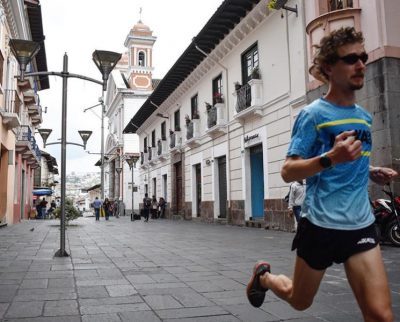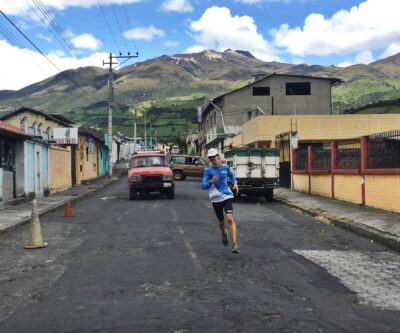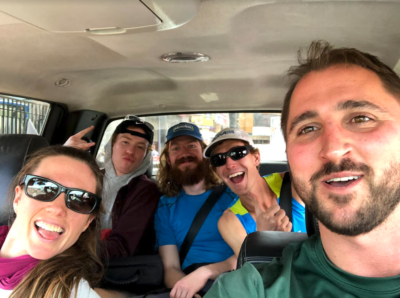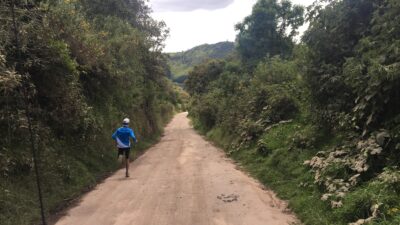Tyler Andrews – The Male Trials Runner Who Didn’t Break 18 Minutes in High School Who Now Trains with Kenyans in Ecuador
by LetsRun.com (Sponsored by HOKA ONE ONE)
February 17, 2020
February is Marathon Month on LetsRun.com as the month ends with one of the greatest events on the athletics calendar, the 2020 US Olympic Marathon Trials in Atlanta. From the contenders, to the dreamers, to the mountain men and women, HOKA ONE ONE has 17 athletes competing at the Trials, and LetsRun.com is partnering with HOKA to profile all of them. We hope these profiles not only show you the cool stories of the people running the Trials, but also help gets you pumped for the Trials, and gives you some advice for your own running.
This content is sponsored content for HOKA, but not approved by them.
Tyler Andrews is one of the most unique runners in the Olympic Marathon Trials. First, he didn’t break 18 minutes for 5k in high school. That is something a lot of the women’s Trials runners did. Secondly, he does a lot of his training in Quito, Ecuador at 9,300 feet. We did a podcast on Tyler’s rags to riches story in 2018 which you can find here .
Since then, Tyler has set the 50k world best on the track, won the US 50 mile championships and his training group in Ecuador has gotten even better with a couple of Kenyan runners. Read all about it below.
Name/ Nickname: Tyler C. Andrews, Ty, Andrés, Chasqui Blanco
Age: 29
Hometown: West Concord, MA
HS/Yr: Concord Academy, 2008
College/Yr: Tufts University, 2013
Occupation: Athlete, coach, Strive Trips (editor’s note: a LetsRun.com advertiser) Co-director
Training Group/Coach: Coach – Jon Waldron. Ecuador: Kallpa Runners
How did you qualify? I qualified first en-route in the Time To Fly 50K on April 13, 2018 (an attempt to break the 50K world record) w/ 2h18 something. My fastest qualifier during the window was from the 2018 Vermont City Marathon which I won in 2’17’44.
Training shoe: HOKA ONE ONE Clifton
Racing shoe: HOKA ONE ONE Carbon X
One random fact about myself I want people to know:
In 1997, I was diagnosed w/ a bone-marrow/blood disease which kept me out of school for a year and almost took my life; I try to be grateful for having been given a second chance at life, especially when times are tough.
High school: What was your high school claim to fame / PRs?
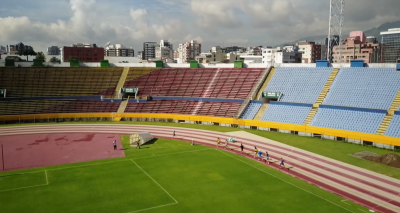 Tyler training in Quito (photo from STRIVE website)
Tyler training in Quito (photo from STRIVE website)
XC: 18’30 5K senior year, 20’30 before that. No T&F
College: What was your college claim to fame / PRs?
Something like 4’29, 14’45, 30’22. Made D3 Nationals twice (once as an individual in 10,000m in 2012 and once as a team in XC in 2012). Ran a 67’07 half marathon at the end of senior spring since I didn’t make track nationals which was probably my best time according to conversions and set me up well for longer road races right after college.
Post-college: What are your post college accomlishments/ claim to fame/ PRs?
After graduating from college, I moved to Quito, Ecuador to chase the running dream for just a little longer. I’d graduated w/ an engineering degree but wanted to give myself 6-12 months to train for longer road races at altitude and see how it would go. I had a strong first 6 months there, lowering my 10K PR to 29’48 and my HM PR to 65’48 (converted from a 20K time). I’d been running significantly higher mileage (over 140 MPW) and clearly was responding well to that and the altitude.
I made my marathon debut the following spring at 2014 Boston and ran 2h21 for I believe 29th place; I followed that up with a win at Vermont City Marathon 5 weeks later in 2h20.
From there, I really focused on the marathon and ran my first OTQ (2’16’59) at CIM 2014. I’d already been in talks w/ HOKA at that point and things got formalized shortly after that. I ran my first 50K in 2015 at US Nationals and was 2nd which earned me a spot on my first of 3 US National Teams for that distance. In 2016, I finished 2nd at 50K Worlds and helped team USA to the team gold.
In 2018, I made an attempt at the 50K World Record and came up short, but ran the second fastest time ever by an American: 2’46’06 (which is also a world record for 50km on a track — yes, they actually keep tabs on that). Since then, I’ve focused more on ultras, requalifying for 50K World Champs in 2019 (which I DNF’d due to food poisoning), but then rebounded and ran and won my first 50 Mile at the US 50 Mile Road Champs.
Road to the Trials
How did you start running?
I really started to care about running as a HS senior in 2007. I’d been on the team up to that point but had never once run out of season (we had no track at my HS) and had never broken 20’30 for 5K. That year, though, we had a new coach, Jon Waldron (who’s still my coach today), and he taught me this lesson which, in retrospect, seems so obvious to be not even worth mentioning: that if you try harder and run more, you’ll get better. That was really it. I honestly thought that being good at running was kind of like being tall; you either were or you weren’t. That season, I started training moderately and consistently and, sure enough, broke 20’, then broke 19’ and ended up w/ a HS PR of ~18’30. More importantly, though, I’d fallen in love w/ this process of self-improvement, this very quantifiable and measurable improvement that I could see every day and week and month. That was really what got under my skin and really lit a fire inside me (to mix metaphors just a bit).
How long have you dreamed of the Trials/Olympics?
Since Feb 14, 2016. I had a terrible race at the 2016 Trials (I had some undiagnosed breathing issues which were exacerbated by the heat) and knew that coming back for 2020 would be hugely important to me both as an athlete and as a person.
What does it mean for you to make the Olympics Trials?
It’s an honor and a joy.
What’s your goal for the Trials?
I want to run the best race I can. As I’ve been focusing more on the ultra world in the last year, I’ve still always known that I have more great marathons in my legs. I think that the hilliness of the ATL course and the fact that I’m coming from such a huge background of strength over the past year’s more ultra-focused training will really play to my advantage. I want to run smart and pass a lot of people in the last 10km.
What do you think of the course?
For someone with my background, I’m thrilled with the course. I had a fantastic race at the US 50 mile championships (which I won in my debut at the distance back in October) and that was a VERY hilly race (5150 ft of climbing). That was the first block where I’d really prepared specifically for a super hilly course and my body really took to it. I felt totally in my element t in training and on race day. Anything that is going to slow the race down I see as a positive.
How has your training gone in the buildup for the Trials?
So far, things have gone great. I had a solid month of base-building in December in Boston, MA and then came down to Quito, Ecuador where I’ve been doing some winter altitude stints the last few years. I train w/ a group here that’s part of Ecuador’s Olympic Development Program and respond really well to the altitude (9300 ft). It’s a perfect place for me where I can do really hilly long runs, get my ass kicked on the track by guys who are much faster than me, and generally enjoy the “training camp” focused vibe.
How long was your buildup?
I won the US 50 mile road champs at the end of October and took a few weeks off before beginning my build-up. By Thanksgiving, I won my hometown turkey trot in ~15’20, so that was probably the beginning of really starting to train. So, all in all, it’ll be about 3 months, but I’m definitely building off of the strength of the ultra block I put in last summer and fall.
What was your highest mileage week? Your average week?
So far, my highest 7 days was about 150 miles (because I had two long runs in 7 days). The 3-week block I just put in averaged 131 miles per week. The next 3 weeks (editor’s note: This training part of the interview with Tyler was done in late January) will probably be right around there or a tick higher. I’ve been much higher in the past (160+), but am more focused on speed right now as I’m coming from such a strength background. And 130 MPW at 9300 ft feels like a good balance between putting in solid volume w/o compromising the track and fartlek days.
What is your favorite workout?
Right now, I’ve actually really enjoyed getting back on the track with my team down here. I’m always a fan of having training partners who are better than me and can push me and that has definitely been the case with this group. Not only am I coming off a 50-miler, but these guys are just way faster. We have 2 Kenyan runners who have run 2h08/61’, plus some Ecuadorians and Venezuelans who are absolute beasts at altitude. This past week we did 6x1K, 6x400m; I think I averaged just under 3’00 for the Ks and 66s for the 400s which, for me at this altitude, is really solid. Miguel, the best runner in our group who was on the 2016 Olympic team for Ecuador, was giving us like 5 seconds head start on all those Ks. Dude is fit.
How much sleep do you get a night?
A lot. Especially when I’m building up volume and in a really big block like I am now. I’m a big believer in naps — I try to nap almost every day, or at least lie down in bed and read. At night, I try to sleep at least 9 hours per night and sometimes as much as 11 if I’m really beat.
We hear that that the people who captured Parker Stinson’s “Endure” series have been filming you in Ecuador. What’s the purpose of the film and when will it be coming out?
Emmett Scully of Trackster (the same people who made the Parker Stinson series) got in touch w/ me back in the fall as I’m friends w/ Parker and he recommended we connect as a very different kind of story to tell (from Parker’s). He came down here to Quito, Ecuador for a couple weeks in January to basically just follow us around and tell our story. One of the things we did that week was put up a big new trail-run FKT (Fastest Known Time) in the mountains next to the city. There will be 4 or 5 videos total in the series and the first one documents that FKT and just came out today (I believe part 2 will be released tomorrow). Here’s a link to part 1:
In terms of the “purpose”, I think the purpose is to give people insight into a pretty unique training style and environment. Other than Walmsley, I’m probably one of the few people doing 6+ hour trail runs through high altitude (14,000+ ft) mountains in prep for the trials. But then, we also put in real work on the track w/ a bunch of 28’/2h08 guys. We’ll do fartleks, faster intervals, etc. and run well under 3’00/km pace which is quick up here at 9,000+ ft. So, it’s a really interesting balance right now, especially as I’m kind of straddling the worlds of marathon and ultra-(trail).
Sounds like your training group in Ecuador is continuing to get bigger? How did 2 Kenyans guys end up in Ecuador training?
Free Training Advice
What one piece of advice would you give to a high school/ younger runner?
Be patient, love the sport. Running is a life-long sport (if you want it to be) and you should find what you love about it. Maybe that’s being on a team and having that social aspect, maybe it’s really internal and all about pushing yourself, maybe it’s some combination of lots of different things. But find the things that make running fun, joyful, and find ways to keep doing those. Don’t let anyone else decide your path.
What one piece of advice would you give to a first-time marathoner?
Be patient (again!). Don’t try anything new on race day.
What is the #1 piece of training advice you’d give another runner?
Figure out what it is that you love about running, what it is that motivates you. Look internally; if the only thing that’s driving you is beating someone or hitting some arbitrary time goal, that’ll only take you so far. There’s always someone else to beat. There’s always another barrier to break. Find the love in the process, the day-to-day, that gets you out the door in the morning.
What one piece of advice would you give to a runner pursuing their dreams?
Don’t let other people or conventional wisdom tell you what you can and can’t do. I was an 18’30 runner in HS and had absolutely no business thinking about the Olympic Marathon Trials (according to conventional wisdom). Even as a 14’45 guy in college, I was still way off. But my coach (Jon Waldron) never told me I couldn’t do something, never told me I could keep getting better. Yes, of course, be realistic w/ your goals. It wouldn’t have been smart for me to be dreaming of Olympic Gold as that 18’30 or even 14’45 guy (or even now as a 2h15 guy). But don’t write off goals completely; try to find intermediate steps and focus on those. One step at a time.
How do you balance training and working?
I work as an administrator for Strive Trips (editor’s note: an advertiser on LetsRun.com) in addition to having a pro contract with HOKA. I’m a co-owner and extremely lucky to have a job where I can more or less schedule my own hours, work from my couch in my running clothes, etc. I have nothing but amazement and respect for the runners that fit their training and recovery around a 40+ hour work week, commuting, parenting, etc. I feel extremely blessed and grateful for the freedom I have in my life and the ability its given me to train and race.
What would you be doing if you weren’t a pro runner?
Man, good question. Probably something not that different except I’d be working more and running less. I did get a degree in Mechanical Engineering and Astrophysics in college, so I could see myself going into science if I hadn’t gotten signed, but at this point, I’m so deep in the running world that I likely see myself staying involved in some capacity for the rest of my career.
What is your favorite running memory?
Honestly, it’s not necessarily any particular great race or workout or anything. My favorite memories (I’m cheating; I know) are those with friends and family that I love and care about. It’s the Team USA trips, the races I’ve run together w/ my best friends and training partners, the races for which my family has come out to cheer. This USOT will combine a lot of those, so I’m confident it’ll be pretty special.
Who inspired you as a runner as a kid?
I didn’t start to follow the sport until my senior year of HS when I went full-in. Up until that point, I really didn’t care about running at all and had no idea how fast pro runners ran. I distinctly remember a friend of my HS coach’s coming to talk to our team and hearing that he had run 47’30 for 10 miles and doing some quick math and realizing that meant he’d run 4’45 mile pace for 10 miles. This totally blew my mind until my teammate (who was more into the sport) explained to me that the marathon WR was faster than that. I think that was the first moment I realized how far up the sport went. That happened in 2007, so I remember being really inspired by the Olympic Marathon Trials in NYC that year, watching Ryan Hall win, and then beginning to get more into the sport. Haile G was definitely an early favorite as well.
What is your race day routine?
As I’ve gotten older, I’ve tried to be more flexible and not get shaken up when the race-day routine isn’t perfect. That said, assuming I have control, I do still have a routine I’d try to follow. It would look something like this:
T-3 hours: Wake up, have coffee, have a light breakfast (usually a granola bar), relax
T-1 hour: Be at the start
T-40-50 min (depending on race/warmup distance): Light jog of 10-20’
T-20 min: drills, strides, get to the line
Probably nothing magical or at all unique there. Basically exactly what everyone else does and what I do before every workout.
Why do you run?
I run because I love it. I love pushing myself, testing my limits physically and mentally. I love racing and competing. I love the monastic simplicity of training. I love the community that running has given me. I love the world-wide travel that I’ve been fortunate enough to experience because of running. I know that even if I weren’t running professionally, I’d still be running in some capacity as it’s simply become a part of who I am.
Anything else you want to share?
I love that you’re highlighting the smaller players in the sport. I’ve always been a fan of the sport first and an athlete second and I personally love reading about the guys who might not be winning majors but are out there grinding nonetheless.
PS — I’ve been really enjoying the podcast the last few months. It’s a great companion for a solo runs. I love listening to Gault and you guys bicker. Keep it up.
More on Tyler: Here’s our LetsRun.com story and podcast with him from 2019.
This content is sponsored content for HOKA, but not approved by them.
Previous HOKA ONE ONE Takes On The Trials Stories:
* HOKA NAZ Elite Coach Ben Rosario Talks 2020 Marathon Trials Expectations, Shoe Technology, Jim Walmsley, & Even Galen Rupp
*HOKA ONE ONE Trials Athlete Of The Day #6: Clinical Cancer Rearcher Manager Liza Reichert Who says you can’t be an Olympic Marathon Trails qualifier and have a very important job? Meet Liza Reichert.
*HOKA ONE ONE Trials Athlete Of The Day #5: Texan and US Mountain Team Member David Fuentes Meet the two-time Trials qualifier who has never broken 2:20 in a marathon. Will the hills of Atlanta result in a big breakthrough for this US Mountain team member? Not only does he work a full-time job, he also has a cool side hustle.
*HOKA ONE ONE Trials Athlete Of The Day #4: Swarnjit Boyal’s: Incredible US Olympic Trials Story Learn how Boyal has progressed from being cut twice in college, to being a walkon, to a conference champion, and now a US Olympic Trials qualifier.
*HOKA ONE ONE Trials Athlete Of The Day #3: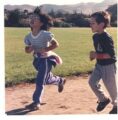 Meet Addi Zerrenner The Trials Qualifier Who Taped a Picture of Shalane Flanagan on Her Wall in High School During her 1st week of HS track practice, Zerrener was told she “ran like Shalane Flanagan” and she’s been hooked ever since.
Meet Addi Zerrenner The Trials Qualifier Who Taped a Picture of Shalane Flanagan on Her Wall in High School During her 1st week of HS track practice, Zerrener was told she “ran like Shalane Flanagan” and she’s been hooked ever since.
*HOKA ONE ONE Trials Athlete Of The Day #2: Former US Marathon Champ Sergio Reyes Ready to Excel at Possibly His Final Trials at Age 38 How many 38 year olds do you know that run up to 140 mpw.
*HOKA ONE ONE Trials Athlete Of The Day #1: 2007 Foot Locker Champ Ashley Brasovan In HS, she beat Jordan Hasay to win the crown and later was told by doctors she would never “run again, let alone compete, after being diagnosed with osteoporosis and having 4 femoral stress fractures.” Yet she’s become a professional trail runner and 2X Olympic Marathon trials qualifier.
*Introduction: HOKA ONE ONE Is Ready To Take On The Marathon Trials

